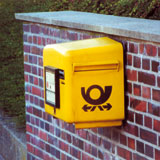Letters, Parcels and Postage

The price for sending letters and parcels depends on size and weight. The German term used for the costs is "Porto". Stamps are available at all post offices, at vending machines outside post offices and in some newsagents or tobacco stores. Every address in Germany has a five-digit "postcode", which defines the village, city or local area. All postcodes are listed in the postcode directory ("Postleitzahlenbuch"), which is available at all post offices. Once a year the new local phone directory and Yellow Pages are issued by the German postal service ("Deutsche Post").
Almost all items sent by post have to be stamped – whether they are postcards or parcels. If the words "Porto zahlt Empfänger" are written on the envelope, then no stamp is needed as the recipient agrees to pay for the postage. A list of postage costs is available at all post offices. The "Deutsche Post" is the postal company most used by private customers in Germany. There are, however, other companies that also deliver letters and parcels.
![]() A list of these companies can be found in the Yellow Pages ("Gelbe Seiten") phone directory under "Kurierdienst", or "Paketdienst".
A list of these companies can be found in the Yellow Pages ("Gelbe Seiten") phone directory under "Kurierdienst", or "Paketdienst".
As before, however, the Deutsche Post AG continues to hold the exclusive rights for most of the postal market (until 31st December 2007).
Particularly important letters or documents can be registered when sent by post. The recipient must sign for the letter before it is delivered. This is called "Einschreiben" in Germany and can be undertaken at any post office.
